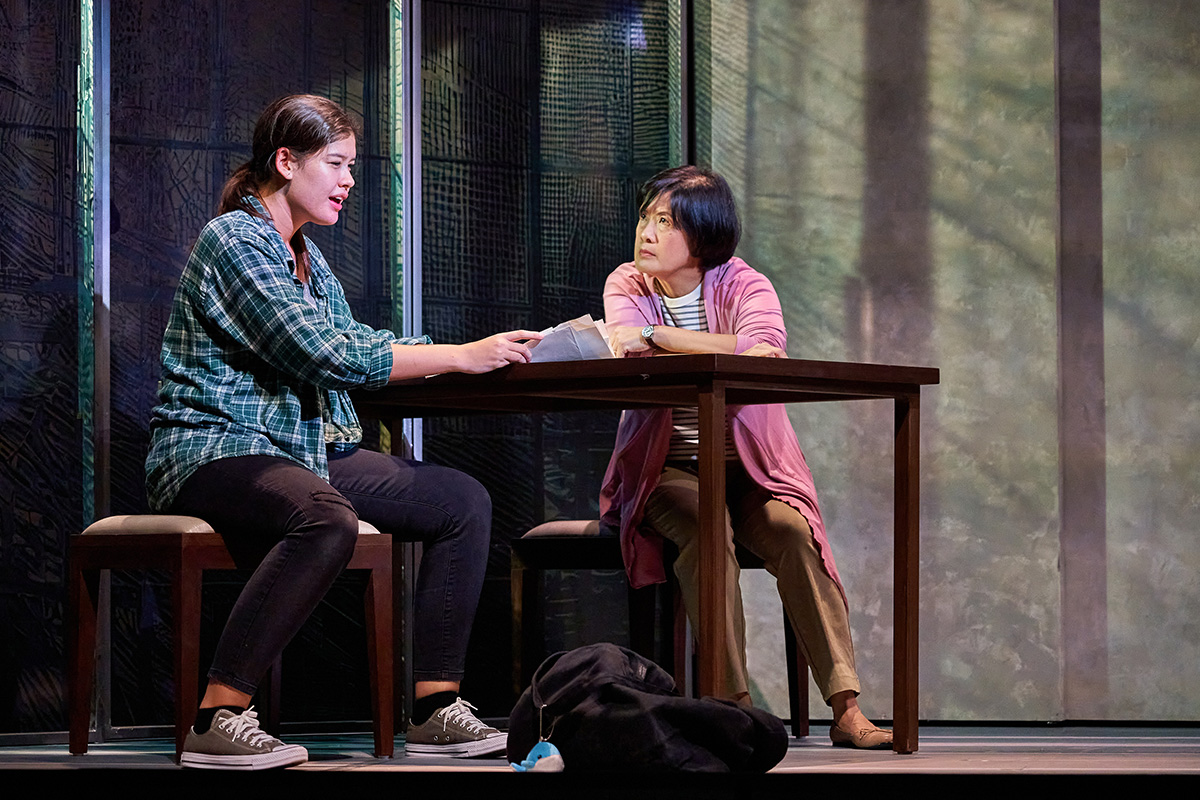By Rachel //
This review may contain spoilers.
The Almighty Sometimes is a multi-award winning play by Kendell Feaver about loving someone with a mental illness. Recently, I was given the opportunity to watch its Asian debut by Singapore Repertory Theatre. I was nervous when I first heard the synopsis. Given how mental illness is often sensationalised by the media, I was concerned that the play would do the same. However, I was pleasantly surprised by the delicate nuance of the play’s plot. Though some parts may be potentially triggering, it was an intense and heartwarming experience for all the right reasons.
The play follows Anna, a 21-year-old with mental illness, who has been on medication for 10 years. A rediscovery of the poems she wrote before starting treatment sparks her quest for identity – who was she before her illness? Fresh in the throes of adulthood, Anna struggles to juggle the challenges of living with her mother, maintaining friendships, and finding a job. She wonders if her medication has suppressed her creativity and made her unable to progress at the speed of her peers.


Works centred around mental illness often focus only on the character living with a mental illness. What I appreciated about The Almighty Sometimes was how Anna’s loved ones were not merely side characters but fully fleshed-out characters with stories separate from hers. The play also introduces us to Renee (Anna’s mother), Vivienne (Anna’s psychiatrist of 10 years), and Oliver (Anna’s boyfriend). We get to follow their stories as well – their hopes, dreams, and struggles. When Anna abruptly stops taking her medication and spirals into manic highs and depressive lows, loving her becomes a difficult task.
The audience sees Renee struggle to juggle her work as a preschool teacher and taking care of Anna, and to stay afloat amidst her own struggles with depression. She comes off as overprotective at times and makes some decisions on behalf of Anna when she was too young to consent, causing Anna to resent her for it in adulthood. With a father who is wheelchair-bound, Oliver was made breadwinner of his family at 23 years old, causing him to suppress his emotions in an effort to remain strong. Meanwhile, Vivienne uses Anna’s old poetry as part of her research on mental illness and comes off as a bit exploitative, even though she needs the money from the research to find a way to make patients like Anna suffer less.
There is no “good guy” or “bad guy” in The Almighty Sometimes, but rather, imperfect characters trying their best to navigate the unfortunate circumstances they find themselves in. They lash out, they cry, they curse in anger – and that is the beauty of the play. It provides a realistic depiction of the human condition in its kindness and ugliness. At the end of the play, you find that you can’t blame any character for their actions.
This is most prominent in the story of Anna and Oliver. We witness how they get together and eventually break up when Oliver is left traumatised after witnessing Anna overdosing. Oliver has always felt like he has to take care of everyone at home and doesn’t have the mental capacity to take care of another. While his actions can appear self-centred at first glance, we remember that he, too, is human. In other media portrayals of mental illness, it is a common (and unrealistic) trope for a mentally ill person to find a significant other who somehow cures them with their mere presence (think Hazel’s depression over her cancer in The Fault in Our Stars seemingly disappearing when she gets together with Augustus). I appreciated how the play conveyed the truth that one right person does not make every bad thing go away.
The Almighty Sometimes is titled as such due to the ‘always, sometimes, never’ options that typically appear in initial psychiatric evaluation forms.
I find that the title, just like the play’s characters, is a reminder that our struggles are rarely straightforward. How can the greyness of our struggles be captured in one word?
The word ‘almighty’ is a reference to Anna’s manic episodes where she has grandiose notions of herself and tends to act condescendingly to her loved ones. The play does not shy away from the ugly side of mental illness, demonstrating the insensitive and downright mean comments by Anna when she is manic and her lack of energy when she is depressed. At one point, she had too little energy to walk or brush her hair. The raw portrayal of a topic so commonly romanticised was a breath of fresh air and so important in spreading nuanced awareness about mental health – something we strive to do at Tapestry.
The play ended on a bittersweet note with just Anna and Renee having only each other, Yet, even without a happy, clean conclusion, the ending is moving as both mother and daughter reconcile once again, promising a glimpse of hope for the future while reminding us that recovery isn’t linear.
The Almighty Sometimes surpassed my expectations with its nuanced, realistic portrayal of mental illness and what it’s like to love someone who has one. Not only did it capture Anna’s stability, but also the absolute worst of her mania and depression.
Works that are grounded in reality, and avoids exploiting mental health for shock value, are essential in challenging superficial narratives about mental health. At the end of the day, the play reminds us that everyone has a story, and that people’s struggles are never easy to decipher.
Amidst the mess, we can choose to be kinder to one another.
Rachel is a 19-year-old who is deeply passionate about mental health advocacy. Besides writing, she dabbles in photography and enjoys curling up in bed with a book.
Read more of our Tapestry Stories here.
Photos from Singapore Repertory Theatre

